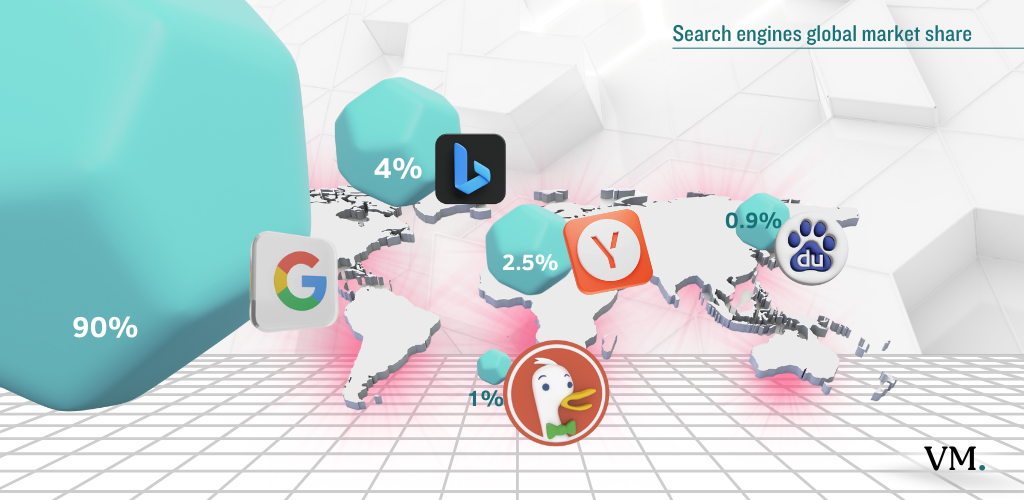Search engines in 2025: from Google’s continued dominance to the rise of AI-powered search and new challengers, there’s a lot to talk about. Let’s break down what’s happening now and how you can make sure your content gets seen—no matter where people are searching.
Google Still Rules, But the Landscape Is Changing
As of early 2025, Google remains the undisputed king of search, holding a staggering 89–90% of the global market share. That means nearly nine out of every ten searches worldwide happen on Google—over 14 billion searches per day, or more than 5 trillion per year Bing, Yandex, and Yahoo trail far behind, each with single-digit shares.
But don’t get too comfortable. The winds of change are blowing.
The Rise of AI and New Search Experiences
Artificial Intelligence is transforming how search engines work. Google CEO Sundar Pichai has announced a major overhaul for Google Search in 2025, with a focus on handling complex, nuanced queries using advanced AI. This means better understanding of user intent, more conversational search results, and a more personalized experience.
AI isn’t just changing Google. New competitors are emerging, and established players are scrambling to keep up. Platforms like TikTok and generative AI-powered engines are challenging Google’s dominance, especially among younger users and those seeking quick, visual, or interactive answers.
AI is also making search more conversational and multimodal. Voice search and long-tail queries are on the rise, and users expect results that match their intent, not just keywords. This shift is making traditional SEO tactics less effective and pushing marketers to adapt.
Is Google’s Dominance at Risk?
While Google’s market share is still overwhelming, there are signs that its grip could loosen. Antitrust rulings, the rise of AI-driven search, and the popularity of non-Google platforms (like TikTok for discovery) are all factors to watch. However, for now, Google remains the go-to for most users.
But the real story is in how people use search. More and more, users want instant answers, zero-click results, and content that feels authentic and engaging. Search engines are responding by prioritizing user-generated content, reviews, and video, and by delivering results that keep users on the search page longer.
How to Optimize Content for All Search Engines
With the search landscape evolving, it’s more important than ever to optimize your content for a variety of platforms. Here’s how:
- Focus on Quality and Authenticity: High-quality, original content is king. User-generated content, reviews, and authentic voices are being prioritized by search engines across the board.
- Embrace Video and Visuals: Video content is booming. Optimize for YouTube, TikTok, and other visual platforms to reach audiences who prefer video over text.
- Think Beyond Keywords: AI is making search more about intent and context than exact keywords. Use natural language, answer common questions, and create content that matches user intent.
- Technical SEO Still Matters: Fast-loading, mobile-friendly sites with clean code are essential for ranking well on any search engine.
- Optimize for Voice and Long-Tail Queries: More searches are happening by voice and with longer, more conversational queries. Make sure your content answers real questions in a natural way.
- Build Topic Clusters and Authority: Search engines value expertise and thematic coherence. Create clusters of content around core topics to build authority.
- Don’t Forget Non-Google Platforms: Optimize for Bing, TikTok, and other emerging platforms. Each has its own quirks and algorithms, so tailor your approach accordingly.
The State of Search Engines in 2025—By the Numbers
The digital search landscape remains a dynamic battleground, with established giants and innovative newcomers vying for users’ attention. Let’s examine the latest data and trends shaping the industry.
Global Market Share: The Big Picture

As of early 2025, Google continues to dominate the global search engine market with an overwhelming lead. According to Statista and StatCounter, Google commands between 89.6% and 90% of all searches worldwide, depending on the month and data source. This means nearly nine out of every ten online searches happen on Google.
Bing, Microsoft’s search engine, is the clear runner-up, but its share is a fraction of Google’s. Bing holds between 3.7% and 4% of the global market, making it the second most-used search engine. Its recent integration of generative AI features, such as Microsoft Copilot, has helped it maintain or slightly grow its position.
Yandex and Yahoo! follow, with Yandex at about 2.5% to 2.6% globally (though much higher in Russia), and Yahoo! at around 1.3%. DuckDuckGo, a privacy-focused engine, holds under 1% of the market, typically around 0.6% to 0.8%. Baidu is dominant in China but only represents about 0.7% to 0.9% of the global market outside its home country.
Emerging and Niche Search Engines
Brave Search is one of the newer entrants, gaining traction among privacy-conscious users. As of early 2025, Brave Search holds about 0.36% of the global search market share, according to recent reports. This puts it just behind DuckDuckGo in the privacy search category.
Perplexity is an AI-powered search engine that has generated buzz for its conversational, citation-based approach. However, as of now, Perplexity does not register a measurable global market share in major industry datasets and is not listed among the top competitors. Its impact is more notable among tech-savvy users and early adopters, rather than the broader public.
Market Share Comparison Table
| Search Engine | Global Market Share (2025) |
|---|---|
| 89.6% – 90% | |
| Bing | 3.7% – 4% |
| Yandex | 2.5% – 2.6% |
| Yahoo! | 1.3% |
| DuckDuckGo | 0.6% – 0.8% |
| Baidu | 0.7% – 0.9% (global)* |
| Brave Search | 0.36% |
| Perplexity | <0.1% (not measurable) |
*Baidu’s global share is low due to its China-centric user base, but it dominates the Chinese market.
Regional and Niche Insights
- Google’s dominance is slightly less pronounced on desktop devices, where it holds about 79% of the market share, but it remains unrivaled overall.
- Bing has seen a modest uptick in usage, partly due to its early adoption of AI features, but it remains far behind Google.
- Brave Search and DuckDuckGo are popular among users valuing privacy, but their reach is still limited compared to the major players.
- Perplexity is growing in reputation for its AI-driven, conversational search, but it has not yet achieved significant market penetration.
Looking Ahead
While Google’s position appears unassailable for now, the rise of AI, privacy concerns, and changing user habits are slowly reshaping the landscape. Bing’s AI innovations, Brave’s privacy focus, and Perplexity’s conversational approach represent new directions in search—even if their market shares remain small. For now, Google remains the undisputed leader, but the future of search is anything but static.
The Bottom Line
Google is still the leader, but the search engine world is changing fast. AI is making search smarter and more personal, and new platforms are challenging the status quo. To stay ahead, focus on quality, authenticity, and a multi-platform strategy. The future of search is here—make sure your content is ready for it.
FAQ
Google is the most popular search engine in 2025, holding about 89–90% of the global market share.
Bing is the second most-used search engine, with around 3.7–4% of the global market share.
Yandex holds about 2.5–2.6% of the global market share, but it is especially dominant in Russia.
Yahoo! accounts for about 1.3% of global searches, while DuckDuckGo (a privacy-focused engine) holds 0.6–0.8%.
Baidu is the leading search engine in China, but outside of China, it only accounts for about 0.7–0.9% of global searches.
Brave Search holds about 0.36% of the global search market as of early 2025.
Perplexity is an AI-powered search engine that has not yet achieved a significant global market share; it is popular among tech enthusiasts but is not listed among the top competitors.
Google’s dominance comes from its advanced algorithms, comprehensive index, strong brand recognition, and integration with other popular services like Android and Chrome.
Yes, AI and privacy are major trends. AI is making search more conversational and personalized, while privacy-focused engines like Brave and DuckDuckGo are gaining traction among certain user groups.
To optimize your content:
-
Focus on high-quality, original content.
-
Use natural language and answer user questions.
-
Optimize for mobile and fast loading times.
-
Create video and visual content for platforms like YouTube and TikTok.
-
Consider privacy and intent in your content strategy.
-
Tailor your approach for each search engine’s unique features and algorithms.
While Google is still the clear leader, the rise of AI, privacy concerns, and new platforms could gradually shift the landscape. However, for now, Google remains the dominant force in search.
Share:




